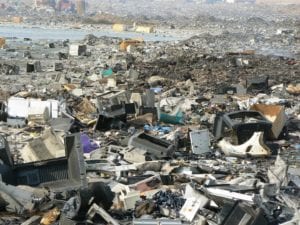The head of the United Nations Environment Programme (UNEP) today stressed the need to limit the use of dangerous chemicals and to find a solution to the masses of electronic waste building up around the world.
Speaking at a Conference of Parties to three major Conventions on the subject, Achim Steiner, UN Under-Secretary-General and Executive Director of UNEP told journalists that the “tsunami of e-waste rolling out over the world” not only accounted for a large portion of the world’s non-recyclable “waste mountain” but also needed dealing with because many elements found in electronic equipment are potentially hazardous to people and the environment. “Never mind that it is also an economic stupidity because we are throwing away an enormous amount of raw materials that are essentially re-useable,” said Steiner. Steiner said that the amount of some such materials that are available above ground in unused electronics now exceeds the amount still in the ground and he looked to the potential of the Basel Convention to help access ‘urban mines’ by working to better inform people of how to dispose of their e-waste.One million people die from occupational poisoning
Over 1 500 delegates are expected to take part in the talks, which aim to improve three international conventions (The Basel, Rotterdam and Stockholm conventions) contributing to global controls on hazardous chemicals and waste.The Executive Director said the three Conventions were not about stopping the use of chemicals but about providing a clear platform from which to inform policy-makers of science that can inform decisions to help protect citizens from toxicity and about signalling to the market that alternatives are needed.
He pointed out how materials used in production of various items are becoming ever more present in people’s daily lives, and he said people were becoming “increasingly a repository for the chemical footprint of the 21st century,” often in ways that damage health. “Annually, one million people die from occupational poisoning,” Steiner said, referring to the effects of the use of chemicals on people’s bodies. “This is something that is, in this day and age, not only unnecessary it’s really intolerable. And this is why the sound management of chemicals is something that has brought Governments, civil society but also the private sector and the chemical industry together.”







